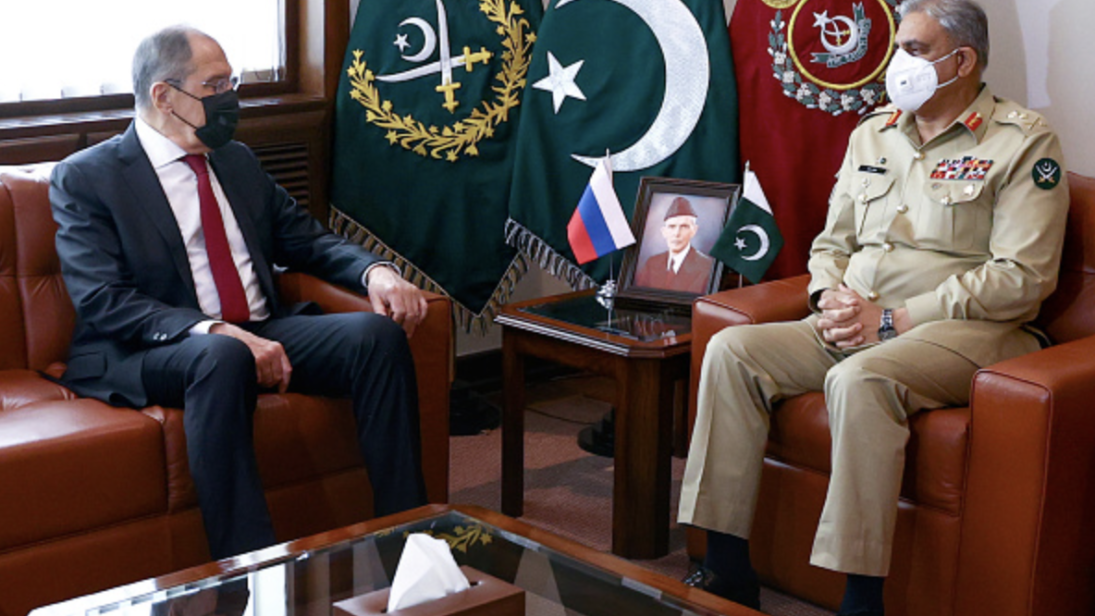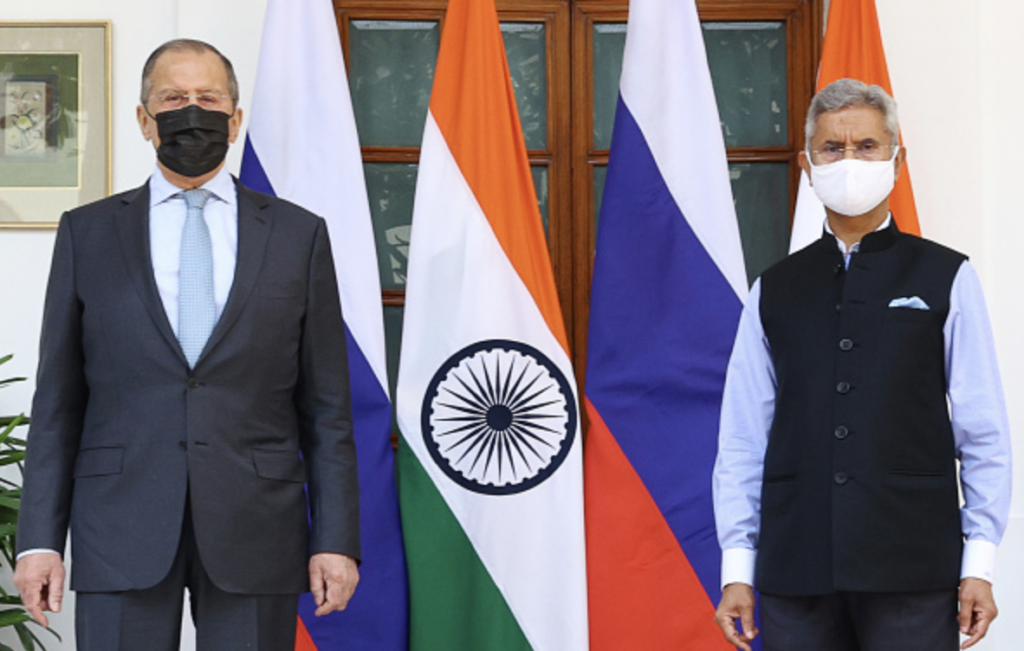
“Today Pakistan is an important foreign policy partner of our country. The cooperation between Moscow and Islamabad is based on the coincidence or similarity of positions on most of the problems facing the world community, including issues of strategic stability and countering terrorism.”
The Russian Foreign Ministry issued the above statement on the eve of Foreign Minister Sergei Lavrov’s April 2021 visit to Islamabad, the first by a Russian foreign minister in nine years, highlighting a qualitative improvement in Russia’s engagement with Pakistan, which has a checkered diplomatic history. In the 1950s-1960s, the Soviet Union sought to economically engage Islamabad, with limited success, given that Pakistan was fairly ensconced in the American camp during the Cold War’s great power contestation in the Third World. This was compounded by Pakistan’s complicity in the killings of over 15,000 Soviet soldiers by the Afghan mujahideen during the USSR’s decade long military intervention in Afghanistan. The emergence of the USSR/Russia as India’s strategic partner only cemented the Russia-Pakistan divide.
Notably, Minister Lavrov’s discussions with Pakistan’s political and military leadership included issues sensitive to India, Russia’s traditional partner. These involved the human rights situation in Jammu and Kashmir, Pakistan’s positive role in tackling terrorism and helping resolve the Afghan quagmire, and criticism of the Indo-Pacific—a concept to which Russia remains vehemently opposed but which has acquired salience in India’s strategic calculus.
With the Russia-Pakistan engagement gaining traction, its impact on the “special and privileged” Indo-Russian strategic partnership bears examination. While it is undeniable that Russia’s previously unreserved support of India’s strategic concerns has become more measured, it would be presumptuous to write off this partnership as it still remains mutually beneficial.
While it is undeniable that Russia’s previously unreserved support of India’s strategic concerns has become more measured, it would be presumptuous to write off this partnership as it still remains mutually beneficial.
Drivers of Russia’s Engagement with Pakistan
This rapprochement is not a new phenomenon. Its genesis dates back to 2014 when the two countries signed the defense cooperation agreement, which explored weapons sales and joint military exercises, and took place against the backdrop of Russia’s Ukrainian confrontation. Today, Russia’s outreach to Pakistan has gained more form and substance. It encompasses an expanding portfolio of weapons sales, military exercises, robust political engagement, and growing economic and energy partnerships.
A deep dive into this rapprochement reflects a combination of tactical and strategic objectives, and Pakistan’s geographical location appears to be a key driver. It is likely that Russia is looking at Pakistan through the lens of ensuring stability in Afghanistan, which borders Russia’s soft underbelly of Central Asian Republics (CARs), especially given Pakistan’s relationship with local Afghans, including the Taliban, with the group progressively gaining strength in Afghanistan. Coupled with the uncertainty caused by U.S. troop withdrawal from Afghanistan, Russia’s outreach is likely a consequence thereof.
The Kremlin appears to have made a distinction between the Afghan Taliban and the Islamic State (IS). Presumably, Russia views the former as an actor with which it can engage to ensure stability in the region given that the Taliban’s operational area is largely limited to Afghanistan. The latter, on the other hand, is viewed as a threat due to its Khorasan philosophy, which seeks to encompass Central Asia. A combination of the CAR’s porous boundaries with Afghanistan and cross-border ethnic linkages have created the potential for the expansion of IS’s radical and violent footprints to the CARs. Notably, IS evokes local support in Central Asia as more than 5,000 Central Asians have joined jihadist organizations, including IS, in Iraq and Syria to date. In this evolving Afghan mire, Russia appears keen to tap Pakistan’s linkages with the Taliban to navigate a stable transition of power in Afghanistan. Perhaps Russia believes that if the Taliban can be adequately accommodated in a political set-up, it could stave off the spread of IS in CARs and contain the ongoing violence in Kabul. Meanwhile, any strategy that puts the Taliban in the driver’s seat in Afghanistan suits Pakistan, as that would enable Islamabad to retain its sphere of influence.

Russia’s calculus of ensuring stability in Afghanistan appears to be a part of its larger game plan to position itself as an indispensable stakeholder in the resolution of the Afghan quagmire. The Moscow Format and expanded Troika, where Russia is a key participant, are seen as vital platforms for exploring a lasting political settlement in Afghanistan. Russian initiatives here have the potential to boost its international and regional profile, especially given the United States’ strategy to globally isolate the Kremlin.
In this context, Pakistan fits in with Russia’s attempts at making new partners. Islamabad’s geographical location at the crossroads of South, Central, and West Asia makes it a key stakeholder in Russia’s Greater Eurasia project—an initiative that Russia is betting on to strengthen its global pole credentials. Perhaps this could even facilitate Russia’s access to the Indian Ocean’s “warm waters,” which remain a national aspiration. Pakistan can also facilitate Russia’s attempts to strengthen partnerships with the Islamic world, an initiative that is likely to be viewed favorably by its substantial Muslim population.
Pakistan’s ongoing cooling of ties with the United States, its traditional partner, are not lost on the Kremlin either. With Russia and the United States often accused of adopting a zero-sum game mentality vis-à-vis each other, realpolitik dictates Russia would seek to increase Pakistan’s strategic autonomy. This outreach could even provide the Kremlin with a safety net from any potential U.S. regional misadventure directed at Russia based out of Pakistan. Meanwhile, Russia’s rapprochement with Pakistan could even be the Kremlin signaling its displeasure to India at New Delhi’s perceived drift towards the West.
Pakistan’s Interests
Foreign Minister Qureshi’s statement that “there was now a ‘new approach and a new mindset for Russia’ in Pakistan because Russia was a player for stability on the global stage” aptly sums up the ongoing Russia-Pakistan rapprochement. Pakistan could be seeking to exploit the wrinkles which have crept into the traditionally strong India-Russia strategic partnership in light of New Delhi and Moscow’s foreign policies not always aligning—be it with regard to the United States, China, Afghanistan, and now Pakistan.
Islamabad would get to tap Russia’s diplomatic heft in addition to exploring the untapped potential of Russian weapons. Historically, Russia had desisted from exporting arms to Pakistan in order to accommodate India’s sensitivity, among other reasons. However, today, Russia has emerged as Pakistan’s second largest source of weapons after China. This military engagement needs to be viewed not only from a transactional perspective—amidst a steady decline in Russian global arms exports—but also from the lens that the Russian military industrial complex (MIC) is one of Russia’s few globally competitive industries. MIC is a key part of Russia’s toolkit for making new partners and Russia could be seeking to establish a leverage over Pakistan to gain concessions in Afghanistan.
Russia’s ongoing outreach to Islamabad is a far cry from Moscow acting as India’s traditional bulwark against Pakistan’s anti-India advocacy. Nevertheless, this reconciliation appears par for the course for a world in flux where new alignments seem to be the order of the day.
How Does This Rapprochement Affect India?
Russia’s ongoing outreach to Islamabad is a far cry from Moscow acting as India’s traditional bulwark against Pakistan’s anti-India advocacy. Nevertheless, this reconciliation appears par for the course for a world in flux where new alignments seem to be the order of the day. This rapprochement is part of the broader fallout of India and Russia’s multi-vectored foreign policies which have seen them pursue new partnerships, often with each other’s key rivals such as India’s robust cooperation with Russia’s traditional rival—the United States—and Russia’s entente with China and its outreach to Pakistan.
Russia’s measured positions on India’s core concerns today, from unequivocal support in the past, can impinge on their strategic partnership and complicate India’s external environment. These include amplifying the Taliban and Pakistan’s role in the Afghan endgame and weapons sale to Pakistan, given that Russia remains India’s biggest defense partner. A Russia-Pakistan geostrategic congruence could muddy India’s Eurasian outreach. By attaching itself to Russia, Pakistan may seek to increase its strategic footprints in Eurasia where it could continue its anti-India campaign.
Conclusion
Russia appears to be reverting to its 1960s posture of engaging India and Pakistan on two distinct tracks. While the die has arguably not yet been cast for the Russia-Pakistan relationship, India is likely to keep watch for any Russia-Pakistan tandem, however embryonic it may seem at present. Given Russia’s multi-vectored foreign policy grounded in pragmatism, it is plausible that Russia may invest in a constructive relationship with Pakistan. In the absence of divisive Cold War tensions and in light of both nations’ diversification of partnerships, mutual benefit is likely to be the guiding motto.
Concomitantly, writing-off the India-Russia strategic relationship would be presumptuous. Their convergences far outweigh their differences and the partnership remains mutually beneficial. The addition of new strategic pillars to their bilateral relationship, such as the recently announced 2+2 dialogue by foreign and defense ministers, has only added to the momentum. The fact that Russia has steered clear of India’s red-lines, be it refraining from participating in the China Pakistan Economic Corridor (CPEC) or selling sophisticated weapons to Pakistan, highlights their special and privileged partnership adjusting to the changing world.
For India, it bears to view the Russia-Pakistan rapprochement through a pragmatic and not a zero-sum lens. This is particularly relevant at a time when neither India nor Russia have hold over each other’s foreign policy strategies. Recognition of New Delhi and Moscow’s core sensitivities and robust bilateral conversations could mitigate emerging misgivings over their developing relations. There are also key strategic cards which India holds vis-à-vis Pakistan for Russia. These include the size of India’s market and its growing global role which offer Russia an opportunity to increase its scope for maneuver amidst its multiple geo-strategic pressures. Realpolitik will call for India to leverage these to temper Russia’s outreach to Pakistan if this rapprochement turns out to be inimical to India’s interests.
Notably, what sets the India-Russia relationship apart is their highest form of collaboration—i.e., joint development and production of defense equipment anchored in trust built through years of robust engagement. This sentiment was aptly reflected in Foreign Minister Jaishankar’s recent statement of Russia expeditiously addressing India’s defense requirements, in a veiled reference to the ongoing India-China border standoff despite the growing Russia-China entente. This should hold India and Russia in good stead in charting the next course of their strategic partnership.
***


